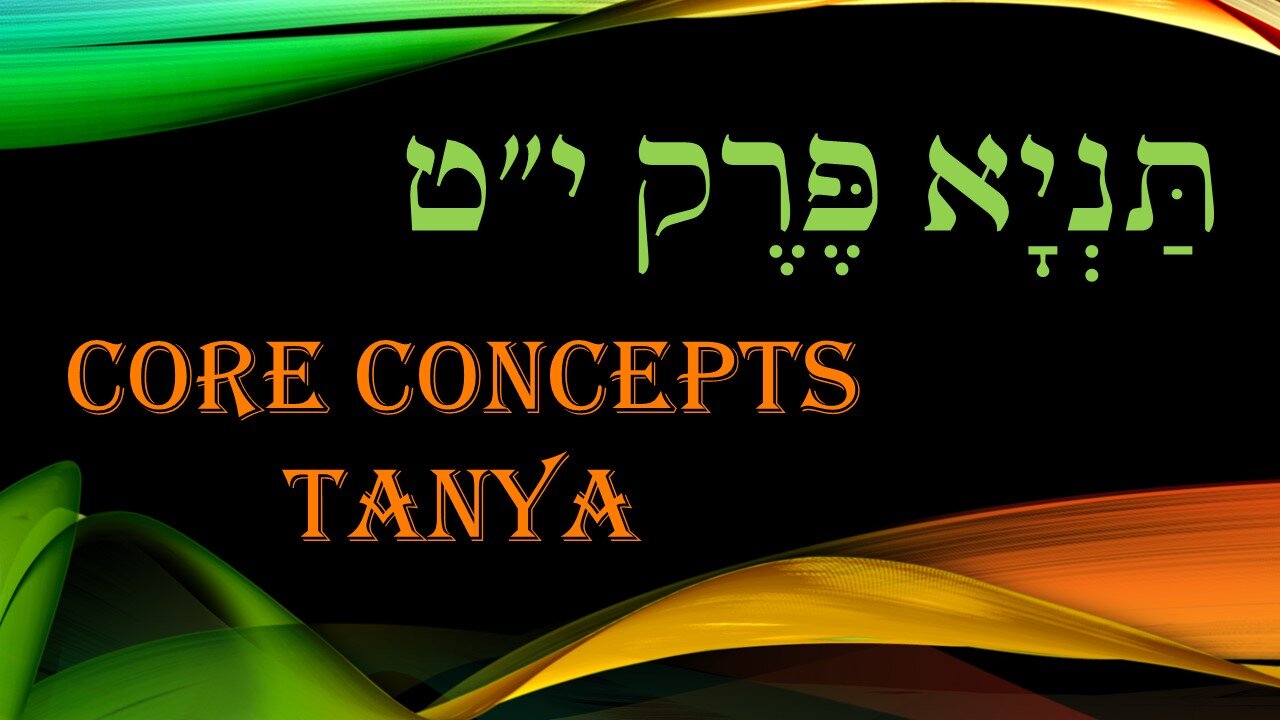Premium Only Content

Core Concepts Tanya: Chapter 19
Brief Recap of Chapter 19:
1. Chapter 19 continues exploring the Hidden Love introduced in chapter 18.
The Hidden Love is the basis for the Alter Rebbe's assertion on the verse that "This thing is VERY near to you, in your mouth and in your heart, to do it"
2. In the book of Mishlei, King Solomon says, "The soul of man is a candle of G-d"
What does this mean?
The nature of fire is to burn upward, no matter which way it's held.
Why? Because fire is trying to reconnect to its source.
3. This is seen in the physical world with the four elements, earth, water, air, fire.
The higher/more ethereal elements surround the lower/coarser elements.
Earth is the coarsest, so it's the lowest in this world.
Water is a bit higher, so it surrounds earth. It is only through G-d's kindness that earth was allowed to poke its way up through water, which is how we have the land we live on in a world mainly covered with water.
Air is even higher than these two, which is why it surrounds them.
Fire is highest of them all, it surrounds our entire atmosphere to the sublunar sphere.
Ergo, fire on land is always trying to reconnect with its source, which is the fire surrounding everything.
EVEN THOUGH reconnecting with its source will result in it no longer being a separate entity.
Once a flame is joined with a larger fire, it's not an individual flame anymore.
4. The soul acts like fire in this way in that it always wants to reconnect with its source, the Source of all life.
This is the nature of the Hidden Love, not a rational desire but part of its intrinsic makeup.
Here, nature is not a derogatory term for something beyond our control, but rather a compliment to the supra-rational nature of the soul.
The body is what holds the soul here in this world, because if it could reconnect it would cease to exist as a separate creation.
In this way, Chochmah is the spark in every Jewish soul that acts like a flintstone, which always retains its capacity to create fire. It just needs to be hit the right way...
5. Unlike k’lipa and sitra achra "the other side," holiness is not seen as a separate entity, but rather what absorbs and reflects G-dliness.
Therefore, it can only be derived from Chochmah in this world, because, as discussed last chapter, that is the only place where there is no sense of self.
Humility is a negation of self to not feel a separate existence before G-d and wholly give over to His will. Which is how you create places where G-d can dwell.
6. K’lipa and negative forces in the world see themselves as separate and independent entities apart from G-dliness.
In general, this is the way impurity works in that it emphasizes the sense of self and ego.
The more someone thinks of themselves as "I am," the more of an "I" he becomes, the more "material and physical," which blocks out G-dliness.
When this happens, the Hidden Love goes into “exile” and is held captive.
And so this love which should be revealed, as is the way with love, becomes hidden.
7. "A man does not sin, unless a spirit of folly enters him."
This spirit of folly is a foolishness and delusion about what sin does to man's relationship with G-d.
Enough of this and man becomes dulled to the BREACH/TEAR that occurs with sin.
Additionally, chasing pleasure simply for the sake of self-indulgence also serves to overshadow that spark within Chochmah.
K’lipa tries to create a divide/barrier between Chochmah and Binah and Da'at, so that Chochmah can't affect and influence it to feel this humility and submissiveness and love of G-d.
If we can't feel this love, if we can't allow it to pervade our entire soul, then it becomes harder and harder to prevent sin.
However, if this occurs, then, like a sleeping person who still fully possesses his faculties that are merely dormant as he sleeps, "blocked off" love is always there as soon as we "wake up."
8. The Alter Rebbe asserts that every Jew, no matter how great or low he may be, would rather give up his life than be separated from G-d EVEN ONE INSTANT.
We should apply that same logic to Torah and Mitzvot:
We refrain from transgressing because it separates us from G-d.
We fulfill mitzvot because that unites us with Him.
9. In summation:
Love of G-d is a desire to have a connection with Him.
Fear of G-d is a dread of ever being separated from Him.
-
 1:55:20
1:55:20
TheDozenPodcast
19 hours agoPrison Officer EXPOSES deaths in custody: Sam Samworth
6.85K2 -
 25:23
25:23
Fit'n Fire
19 hours ago $0.30 earnedThe Krink at Home Part 2 - PSA 300 Blackout Krink vs PSA 5.56 Krink
3.17K3 -
 1:01:29
1:01:29
PMG
17 hours ago $1.85 earnedTrump's Speech, SCOTUS Forces USAID Payments, and Justice For MRNA Vaccine Victims
9.88K7 -
 4:23:59
4:23:59
STARM1X16
13 hours agoSunday Night Duos
86.1K4 -
 1:02:11
1:02:11
The Dan Bongino Show
1 day agoSunday Special with Vince Coglianese, Rep. Tim Burchett, Rep. Byron Donalds & Vivek Ramaswamy
219K354 -
 2:29:38
2:29:38
TheSaltyCracker
13 hours agoPiss Off War Pigs ReeEEeE Stream 03-09-25
223K397 -
 1:03:55
1:03:55
Sarah Westall
15 hours agoCanada Media Mind Control to increase Assisted Suicide, Confusion & Enslavement w/ Jasmin Laine
84K17 -
 2:41:11
2:41:11
Canal Paulo Figueiredo
2 days agoPedro Valente Debunks The Myths of Jiu-Jitsu History
81.8K10 -
 2:01:46
2:01:46
vivafrei
14 hours agoEp. 254: China to Pay $24 BILLION? Who Owns Embryos? Tulsi was RIGHT on Syria! Prorogation & MORE!
193K170 -
 3:40:55
3:40:55
MyronGainesX
1 day ago $25.73 earnedFormer Fed Explains Gabby Petito's Murder
113K41